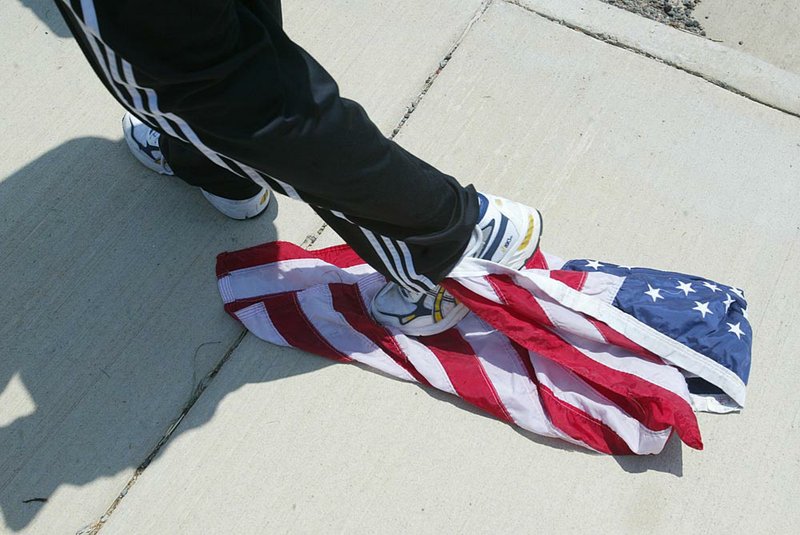LITTLE ROCK — A proposed state law to further restrict how close protesters can get to funerals moves to the Senate this week as the U.S. Supreme Court continues to study whether such protests are intentional attacks against grieving families or a form of protected free speech.
Arkansas Code 5-71-230 currently requires protesters to stay at least 150 feet from a funeral for the 30 minutes before, during and 30 minutes after the funeral. House Bill1207 doubles that distance to 300 feet from the entrance to a building or cemetery where a funeral is being held.
Introduced by Rep. Randy Stewart, D-Kirby, the bill passed in the House with little fanfare Thursday in a 97-0 vote. The Senate Judiciary Committee is to take up the measure Monday.
“You know, 150 feet isn’t very far, especially for a lot of rural cemeteries. They are wide open,” Stewart said. “A little wider buffer zone protects the mourners.”
He said it protects the protesters as well.
“We didn’t take their right away and we made this bill content-neutral,” Stewart said. “This bill would cover anybody. This could be a bad guy or a good guy being buried, a murderer, anyone in Arkansas. No matter who you are, you are afforded this protection, this privacy at the funeral.”
As a retired lieutenant colonel, Stewart said he approached the bill from the perspective of the soldier and the grieving families.
“I wanted to make it so it still allowed people to protest, but limit where they could do it to give more protection to the family and friends from seeing the protests.”
Westboro Baptist Church in Topeka, Kan., led by Fred Phelps Sr., has been protesting at military funerals across the country for more than five years now as part of the group’s belief that the death of troops in war is God’s punishment for the nation’s acceptance of homosexuality. Protesters often carry signs with slogans such as “Thank God for Dead Soldiers.”
The U.S. Supreme Court is currently deliberating on a case where the family of a Marine killed in Iraq in 2006 sued the Westboro protesters for causing emotional distress by picketing at the Marine’s funeral. The award by a lower court of more than $10 million in damages to the family was appealed by the Westboro group.
The case was argued Oct. 6, but the justices have not yet released their opinion on the case. The issue of free speech versus harassment wove common threads through the oral arguments.
Justice Ruth Bader Ginsburg said, “This is a case about exploiting a private family’s grief, and the question is: Why should the First Amendment tolerate exploiting this bereaved family when you have so many other forums for getting across your message.”
She also noted that several states have restrictions on funeral protests to protect family privacy. Currently Arkansas is one of more than 43 states with funeral-protest restrictions, according to the First Amendment Center, a branch of The Freedom Forum, a nonpartisan foundation focused on the First Amendment.
“As I understand it, after this case arose, Maryland passed a statute putting time, place and manner restrictions,” Ginsburg said in her arguments. “I read that statute, and it seems to me that there was nothing unlawful, nothing out of compliance with that statute, that was done there.”
Maryland, Arizona and several other states have the 300-foot limit on funeral protests. More-restrictive laws in states such as Missouri that tried to ban protests along public roadways and funeral procession routes have been shot down as too restrictive and a violation of freedom of speech in federal court of appeals cases.
Rep. John Edwards, D-Little Rock, is a co-sponsor on the bill and helped draft the final document.
“A funeral is one of the most personal things we will ever attend,” he said. “What we’re saying is, your picketing moved to 300 feet from where a funeral is held. There are still plenty of avenues to have the protest and get your message out to the public.We’re simply clarifying in this law that a funeral is a personal space where a family has a right to mourn their loved one. It is a privacy right everyone should have.”
So far, Stewart’s bill has met with little opposition.
Rita Sklar, state director for the Arkansas Chapter of the American Civil Liberties Union, said she is “totally sympathetic of the motive” behind the bill.
“I think the behavior they are trying to restrict is perfectly disgusting,” she said. “And I think what they have done may or may not stand up to Constitutional muster. I think that is something that will be decided by the courts.”
But, she added, “The ACLU is concerned anytime an exception is carved out for any fundamental right for freedom of speech.”
It’s a fine balance, she said, “to respect the family’s privacy and dignity of a funeral and still give the protesters, however heinous their statement may be, to get their message out.”
Front Section, Pages 1 on 02/20/2011


